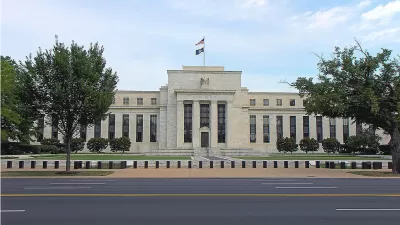Heard of food deserts? Some neighborhoods are banking deserts, where credit unions are the only reputable financial service providers. Now, these community institutions are getting easier access to federal recognition.

If you're tired of Chase or Citibank branches as ubiquitous as Starbucks, don't be. In some low-income communities, banks are few and far between. Unless they want to take their chances with payday lenders and the like, credit unions can be residents' only option.
Often, Oscar Perry Abello writes, "In neighborhoods that other institutions largely neglect, religious congregations cobble resources together to provide access to child care, education, healthcare, workforce development and even financial services." Credit unions can be one of those services.
In an uncertain federal climate, entities like the National Credit Union Administration (NCUA) and the U.S. Treasury's CDFI Fund are still making it easier for credit unions serving low-income populations to get certified. As community development financial institutions (CDFIs), credit unions can better support small business lending. The CDFI ecosystem also includes banks, venture funds, and loan funds, which often back affordable housing.
Abello writes, "The CDFI Fund's grant programs can often support for hiring new staff or training staff to expand product offerings. Public sector support is often the only way such credit unions can finance expanded product offerings."
FULL STORY: Credit Unions Get Streamlined Path to More Neighborhood Investment

Planetizen Federal Action Tracker
A weekly monitor of how Trump’s orders and actions are impacting planners and planning in America.

San Francisco's School District Spent $105M To Build Affordable Housing for Teachers — And That's Just the Beginning
SFUSD joins a growing list of school districts using their land holdings to address housing affordability challenges faced by their own employees.

The Tiny, Adorable $7,000 Car Turning Japan Onto EVs
The single seat Mibot charges from a regular plug as quickly as an iPad, and is about half the price of an average EV.

Seattle's Plan for Adopting Driverless Cars
Equity, safety, accessibility and affordability are front of mind as the city prepares for robotaxis and other autonomous vehicles.

As Trump Phases Out FEMA, Is It Time to Flee the Floodplains?
With less federal funding available for disaster relief efforts, the need to relocate at-risk communities is more urgent than ever.

With Protected Lanes, 460% More People Commute by Bike
For those needing more ammo, more data proving what we already knew is here.
Urban Design for Planners 1: Software Tools
This six-course series explores essential urban design concepts using open source software and equips planners with the tools they need to participate fully in the urban design process.
Planning for Universal Design
Learn the tools for implementing Universal Design in planning regulations.
Smith Gee Studio
City of Charlotte
City of Camden Redevelopment Agency
City of Astoria
Transportation Research & Education Center (TREC) at Portland State University
US High Speed Rail Association
City of Camden Redevelopment Agency
Municipality of Princeton (NJ)





























